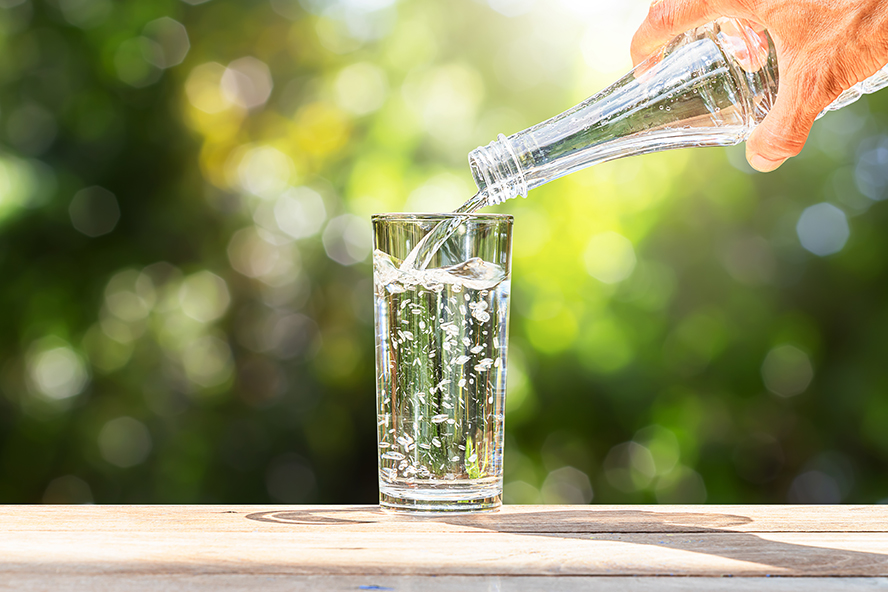


The importance of drinking plenty of water is not limited to the body's natural need for water. Many vital functions depend on water. Most of the body weight of an adult human being is made up of water. This makes water consumption critical in daily life.
Why is it important to drink water?
Water is one of the most common substances on earth and is indispensable for life. Most of the human body is made up of water and most of the basic biological functions depend on water. People use water in every aspect of their lives. The body's need for water is a basic requirement for digesting nutrients, removing wastes, keeping body temperature in balance and maintaining the activities in cells. Drinking enough water every day is essential for these processes to work in a healthy way.
Body Functions
Water plays a critical role in almost all of the body's basic functions. At the cellular level, the presence of water is essential for transporting nutrients into cells, removing waste and maintaining the structure of cells. All chemical reactions within the body take place in a water environment. This allows metabolic activities to continue. Water also plays an important role in balancing body temperature. By expelling excess heat through sweating, the body prevents overheating and keeps its temperature at an ideal level. Drinking enough water helps to cool the body in hot weather or during physical activity. In addition, water is included in joint fluids and is essential for joint health and mobility.
Elimination of Toxins
The body produces various waste substances as a result of metabolism and their elimination is critical for maintaining the body's health. Water helps filter these toxins and waste substances through the kidneys. The kidneys filter the blood and excrete harmful substances in the urine. Adequate water consumption is essential for this process to take place efficiently. When there is insufficient water, the kidneys excrete waste materials more intensively, which can lead to health problems such as kidney stone formation. In addition, the accumulation of toxins in the body can have negative effects on energy loss, skin problems and general health. Drinking plenty of water optimizes this cleansing process, allowing the body to effectively remove toxins.
Digestive Health
Water plays an important role in the breakdown, absorption and elimination of nutrients. First, water contributes to the digestion of food. When food reaches the stomach, water helps break down the nutrients together with stomach acids and ensures that these nutrients are better absorbed by the body. Water also facilitates the passage of nutrients from the intestines into the bloodstream and can prevent constipation by helping to make stools soft in the final stages of digestion. Not consuming enough water can lead to inefficient bowel function, which can lead to digestive problems, especially constipation.
Mental Performance
Water is an important element that has a direct impact on mental performance. The brain is largely made up of water and an adequate intake of water contributes to the proper functioning of brain functions. Inadequate water consumption can make it difficult for the brain to work efficiently and can have negative effects such as mental fatigue, loss of concentration and memory problems. Dehydration slows down brain function and can negatively affect cognitive skills. This can result in difficulty focusing, mental fatigue and poor decision-making. Even mild dehydration can reduce cognitive performance. Drinking plenty of water, especially during intense work, learning or mental tasks, provides the support the brain needs and increases mental clarity and efficiency.
Skin Health
Water is an important ingredient that has positive effects on skin health. Water plays a major role in keeping the skin moisturized, giving it a healthy glow and maintaining its elasticity. Abundant water consumption ensures that the skin is moisturized from the inside. Thus, the skin looks more vibrant and supple. At the same time, water helps to remove toxins from the body and prevents the formation of acne and other skin problems. Dehydration can lead to dry, flaky skin and signs of premature aging. Lack of water can lead to loss of skin elasticity and the appearance of fine lines. Drinking plenty of water supports younger and healthier skin.
Boosting Energy Levels
Drinking water plays an important role in increasing energy levels. Since most of the body is made up of water, energy production and metabolic processes depend on water. Drinking plenty of water increases the oxygen carrying capacity of cells and supports metabolic activities. This makes you feel more energized throughout the day. Dehydration, on the other hand, can lower the body's energy level, leading to fatigue, exhaustion and loss of concentration. When dehydrated, the body struggles to produce energy, which negatively affects physical performance and mental clarity.
Weight Management
Water is an important supportive factor in weight management. Drinking plenty of water speeds up metabolism, increases calorie burning and facilitates weight control. Drinking water before meals fills the stomach and creates a feeling of fullness, which can help you eat less. At the same time, water is a healthy alternative to other beverages (sugary drinks, fruit juices, carbonated drinks) as it contains no calories. Choosing water instead of sugary drinks can help to lose or maintain weight by reducing daily calorie intake. Water also helps metabolize fats and enables the body to effectively remove waste products. This supports weight management.
What happens if you don't drink enough water?
Without drinking enough water, many of the body's functions are negatively affected and various health problems can arise. Meeting the daily water requirement is essential for maintaining both physical and mental health. The harms of not drinking enough water are as follows:
- Dehydration: Insufficient water intake causes dehydration in the body. This can manifest itself in symptoms such as weakness, dizziness, headache, dry mouth and impaired concentration. Severe dehydration can lead to serious health problems, including kidney failure and shock.
- Loss of Energy and Fatigue: When the body loses water, metabolic processes slow down. This leads to low energy levels and a feeling of fatigue. Physical and mental performance decreases.
- Digestive Problems: Water is critical for the digestive system. When not enough water is consumed, digestive problems such as constipation occur and it becomes difficult for the intestines to function properly.
- Impaired Kidney Function: Water is essential for the kidneys to filter toxins from the body. Insufficient water intake makes it difficult for the kidneys to perform this function and can lead to kidney stones.
- Deterioration of Skin Health: Lack of water can lead to dry skin and loss of elasticity. This leads to signs of premature aging.
How Many Liters of Water Should You Drink a Day?
How much water to drink per day varies depending on personal needs, lifestyle and environmental conditions, but as a general guide, it is recommended that adults consume 2 to 2.5 liters (8 to 10 glasses) of water per day. Men generally need slightly more water than women. However, this amount can increase depending on factors such as exercise, hot weather, pregnancy or breastfeeding. If you are physically active, you may need to drink more water to compensate for fluids lost through sweating.
Frequently Asked Questions
Does Drinking Plenty of Water Make You Lose Weight?
Drinking plenty of water can help you lose weight, but it is not a miracle solution on its own. Drinking water can increase calorie burning by speeding up metabolism and suppress hunger so you eat less. Drinking water, especially before meals, fills the stomach and creates a feeling of fullness, which can help you reduce portions. Water also contains zero calories, making it a healthy alternative to sugary drinks. This can reduce your daily calorie intake.
Is Drinking Plenty of Water Good for Acne?
Adequate water consumption can help reduce acne by contributing to skin health. However, drinking water alone does not solve all skin problems. A healthy diet, regular skin care and proper product use are also important in solving acne problems.
Does Drinking Plenty of Water Lower Blood Pressure?
Drinking plenty of water can help stabilize blood pressure. Fluid balance in the body is one of the factors affecting blood pressure. Dehydration can increase blood pressure by reducing blood volume. Therefore, adequate water consumption can help regulate blood volume and keep blood pressure in balance. However, if you have high blood pressure problems, you should definitely consult a doctor.
Does Drinking Plenty of Water Lower Sugar?
Drinking water can help stabilize blood sugar levels. Especially when thirsty, the blood can become denser and this can raise blood sugar levels. Drinking plenty of water helps the body metabolize glucose more efficiently, which supports more stable blood sugar levels.
Bibliography:
https://www.healthdirect.gov.au/drinking-water-and-your-health
https://www.healthdirect.gov.au/drinking-water-and-y